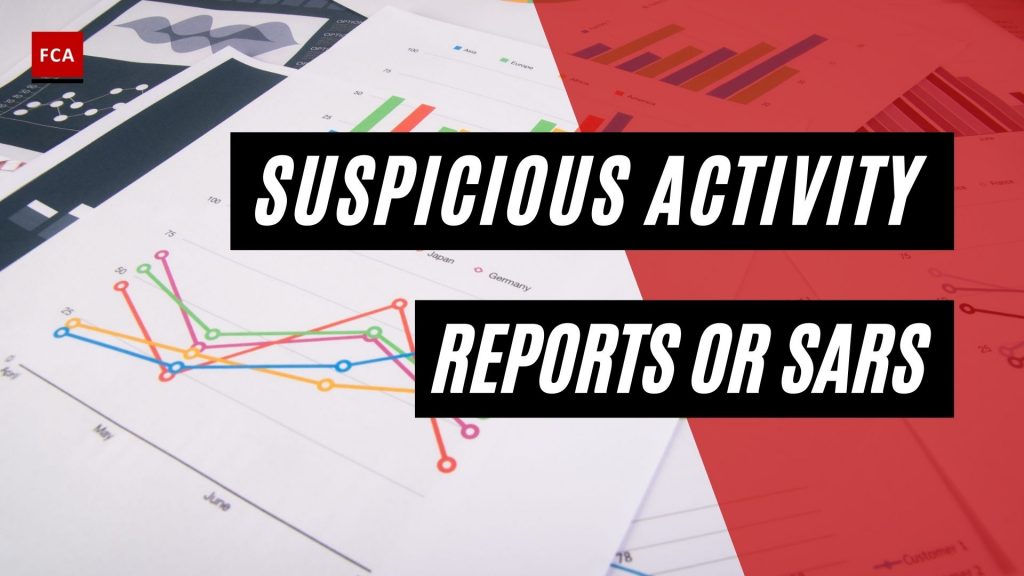Suspicious Activity Reports or SARs. Markets Compliance Regulations such as MAR extends the scope of the requirement to report suspicious transactions to the relevant competent authority. The reporting requirement extends to suspicious orders, modification to and/or cancellation of transactions or orders, and OTC derivative transactions and orders.

Suspicious Activity Reports Or SARs
When there is a suspected case of money laundering or fraud, financial institutions and those associated with their business must file a Suspicious Activity Report (SAR) with the Financial Crimes Enforcement Network (FinCEN). These reports are tools for monitoring any activity in the finance-related industries that is deemed unusual, a precursor to illegal activity, or may endanger public safety.
MAR also requires market operators, investment firms, and persons professionally arranging or executing transactions (which could include AIFMs, UCITS Managers, proprietary traders, and those engaged in algorithmic trading as defined in MiFID II) to establish and maintain effective systems and procedures to prevent and detect actual or attempted market abuse and to report same to the competent authority without delay.
Financial Crimes Enforcement Network
FinCEN, after it consulted with the stakeholders of the U.S. Securities and Exchange Commission and the Commodity Futures Trading Commission (CFTC), issued guidance that, under the Bank Secrecy Act (BSA) regulatory requirements, securities broker-dealers, and commodity brokers may share the Suspicious Activity Reports (SARs) with the parent entities, both domestic and foreign entities.
The filer of a SAR is prohibited from notifying any person involved in the suspicious activity or transaction that the activity and transaction have been reported. The regulations issued by the FINCEN have interpreted the confidentiality provision as generally prohibiting a securities broker-dealer, or introducing broker in commodities from disclosing the SAR, except where such disclosure is requested by the law enforcement authorities, and agencies including securities industry regulatory agencies, or the FINCEN.
The securities brokers, or introducing brokers that file a SAR may disclose to companies within its group that information about the customer and the transaction(s) are reported. To fulfill the SAR responsibilities, the parent companies may have a valid need to review compliance by securities broker-dealers, futures agents, or introducing broker which has legal requirements to identify and report suspicious activity. The securities broker-dealer, futures agents, or introducing broker may share a SAR with the parent company. If the corporate structure of a securities broker-dealer, futures agent, or introducing broker in commodities includes various parent companies, the filing institution’s SAR may be shared with each company in the group.
The FinCEN has not taken a definitive position concerning whether a securities broker-dealer, futures agents, and introducing broker in commodities are permitted to disclose to the companies within its group, the SAR itself. The conclusion to this matter became an important issue, particularly in a global financial market.
Broker-Dealer
There may be circumstances under which a securities broker-dealer, futures agent, or commodity broker would be liable for disclosure of a SAR by a recipient parent company. Therefore, the stakeholders involved, as part of the anti-money laundering program, must have to ensure that a written confidentiality agreement is made that specifies that the parent company shall protect the confidentiality of the SAR through the application of appropriate compliance controls. The sharing of a SAR with a non-U.S. company raises additional issues about the ability of the foreign company to protect the sharing or filing of SAR as per applicable foreign laws.
The FinCEN, in consultation with the Securities and Exchange Commission (SEC) and CFTC, is considering whether a SAR may be shared with an affiliate company, inside the United States or where the affiliate company is located abroad. These issues are required to be resolved through the confidentiality agreement. The recipient foreign parent company should not disclose further any SAR, or the fact that it has been filed however, the foreign company may disclose without permission underlying information that does not explicitly reveal that a SAR was filed considering the requirements of applicable laws and regulations.
Who Regulates Suspicious Activity Reports?
The Bank Secrecy Act (BSA) of 1970 provides a tool called suspicious activity reports. The SAR, originally known as a “criminal referral form,” became the standard form for reporting suspicious activity in 1996. The USA Patriot Act expanded SAR requirements to help combat domestic and global terrorism, primarily by assisting financial institutions in detecting and reporting known or suspected violations.
SARs, whether financial or otherwise, allow law enforcement to uncover and prosecute significant money laundering, criminal financial schemes, and other illegal activities. SARs allow governments to identify and analyze emerging trends and patterns in a wide range of personal and organized crimes. They can use this knowledge to anticipate and counteract fraudulent and criminal behavior before it takes hold.
Final Thoughts
The criteria for issuing a SAR vary by country and even by institution, depending on the nature of the suspicious activity and the specifics of the bank or fund. In a few cases, FinCEN in the United States requires a suspicious activity report. First, if a financial institution suspects an employee of engaging in insider trading, it must file a report. It is not, however, limited to employees. Customers’ transactions are also monitored by financial institutions. A report is required if potential money laundering or BSA violations are discovered. Computer hacking and customers conducting unlicensed money services are also grounds for action. The SAR must be filed within 30 days of the detection of potential criminal activity.








